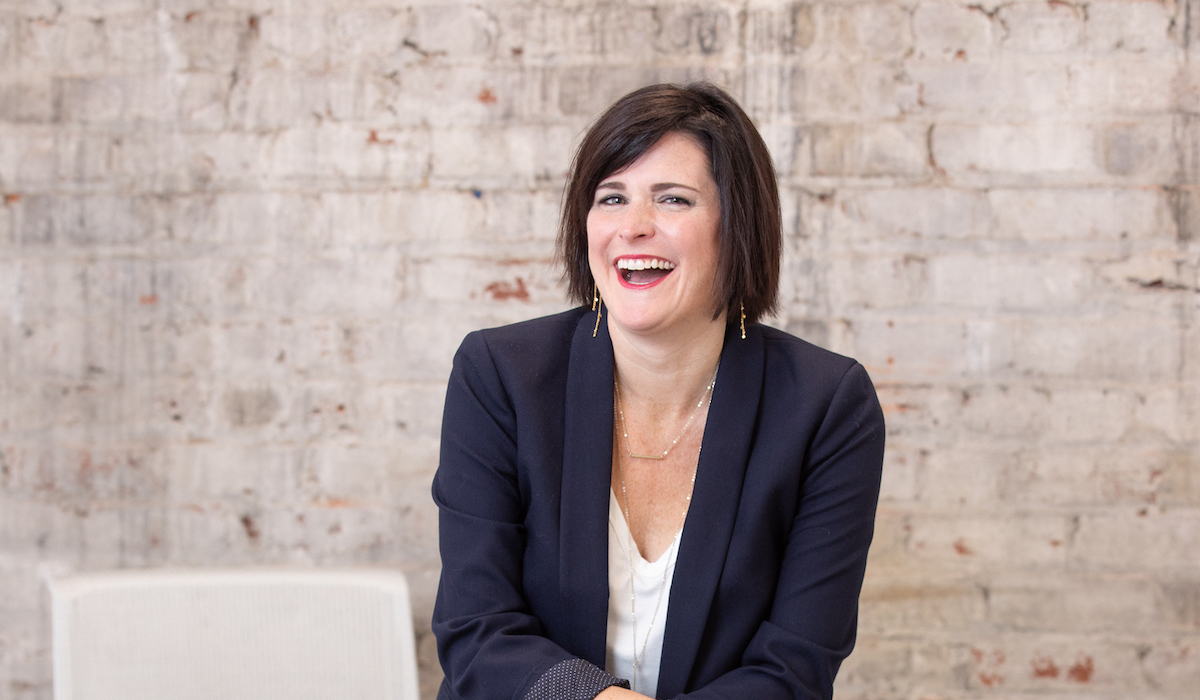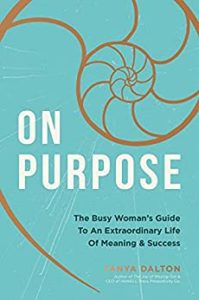Tanya Dalton on Dropping the Self Doubt and Stepping into Our Purpose

Tanya Dalton has built a career out of helping people—mainly women—break free from societal expectations. Dalton’s first book, the best-selling The Joy of Missing Out, is a rallying cry for weeding out the unnecessary from our to-do lists. In her newest book, On Purpose: The Busywoman’s Guide to an Extraordinary Life of Meaning & Success, Dalton reveals how women hold themselves back by listening to limiting beliefs and following the status quo. In defiance, she offers a roadmap for how we each can create change, move forward with intention, and step into our unique purpose. “I want women to live on their own terms,” says Dalton. “And if they need a permission slip to do that, this book is it.”
A Conversation with Tanya Dalton
What does it mean to live ‘on purpose’?
Living on purpose is about rising to be the best version of you. It is not about changing who you are or making these big shifts or taking huge leaps across a chasm. It’s about making little tweaks. It’s about being intentional.
The word “purpose” can be heavy. People feel that they can’t figure out their purpose. But purpose is about living bigger. It’s looking into the future and thinking: Where do I want to go? What is it I desire? What impact do I want to make on my world, my family’s world, the world at large? Then it’s about connecting what we do today to that bigger picture.
You divide your new book into four parts: reflection, projection, action, and alteration. Why is reflection important, and why can it be so hard to do?
We must first see how far we’ve come so we can see how far we can go. We must look at what I call our ‘breadcrumbs.’ What often happens when we reflect, though, is we only look at the good things, which are like shiny trophies. We tend to avoid looking at the places where we have failed, where we had trauma, or the things that we don’t like. But those are the best places to look because they hold the lessons. We see that we have overcome things and we have resilience. We look back and go ‘wow, I did make it out of that deep dark hole.’ That is why reflection is so important. But we’d rather do anything—we’d rather clean out the cat’s litter box!—than to look back. But looking back is our fertile ground.
We also lose sight of who we are because we’re so busy being adults. We think we must do all these things and then we forget what we are passionate about. I often hear from women: ‘I don’t even know what I want to do. I don’t know what I enjoy.’ And I say, ‘let’s go back and reflect on who we were and what you love.’ By doing this, we can start to build back up. Reflection is a process of rediscovering you.
How does projection—looking at the ‘bigger picture’ and at our future selves—play part in the work?
We often have a hard time connecting the dots between ourselves today and ourselves in the future. The research supporting this is fascinating. [Psychologist Hal Herfield’s] fMRI study shows that we see our future selves as strangers. You, in the future, is not you! Our brains are hardwired to survive today, which makes us conditioned to be afraid to really look at what’s possible for ourselves. But when we open up and connect what we’re doing today with our future and what we want, that’s when we feel more on purpose.
You write that you don’t want your readers to fit into the status quo. Yet so many women—me included—struggle with doubting themselves and feeling as though they need to fit in and check all these boxes, even when that doesn’t bring us joy. What’s behind this?
It is all about feeling like we must play by the rules. Yet, who’s defined those rules? We never stop to ask that question of ourselves: Who’s defining the rules? Why are we living to them if we’re not the ones making them? When we stop to ask that, and we work to break from those chains—the chains of who we think we’re supposed to be, or who we should be, or even how far along the path we’re supposed to be—we’re able to authentically set into who we are.
We run around all day checking a thousand things off the list. Then when we fall into bed exhausted and think: Why didn’t I do more? I haven’t done enough. But what is enough? We haven’t even defined that for ourselves. We’re never smart enough, strong enough, pretty enough, fit enough. We’re constantly striving for something that hasn’t been defined and we don’t even realize that we get to define it. This exhaustion happens when we’re not doing the things that are really tied to our purpose. We’re doing a lot of the things that don’t really matter instead of doing fewer things that really matter to us. When we do fewer things that are tied to our tomorrow and to our purpose, that’s when we go to bed thinking: today felt good.
How do we handle guilt or shame?
How is guilt serving you? Let me go ahead and answer that: It’s not. There is so much guilt that’s piled onto us on a regular basis. I don’t know why that is, but it is, especially for us women. We have these expectations, and they don’t even come from inside of us. Often [these expectations] come from other people projecting onto us and projecting what we’re supposed to do.
What’s your advice for when action feels overwhelming?
We tend to think that the opposite of stuck is unstuck. Like there’s this magic moment where the clouds part and suddenly we’re unstuck. But the opposite of being stuck is action. It doesn’t have to be giant leaps. It can be a tiny, mini step; something toward that direction of where you want to go. It just needs to be achievable by you—and what’s achievable by you is different from what is achievable by anyone else. That’s for you to decide.
That’s the beginning of momentum. Once you make one tiny step, it’s easier to make two tiny steps, and then a little bigger step, and then another bigger step. The next thing, you know, you’re able to run.
It’s easy to say, ‘I have no choices,’ but that’s a cop-out. That’s a lie that we tell ourselves and that holds us back. You always have a choice. The other day I felt like I had painted myself in the corner. I felt stuck. Then I realized I hadn’t looked up to see that there is no corner. There are no walls. We’re never painted into a corner. There’s always an opportunity. We tend to lose sight of that because we’re so busy looking down at what we’re doing that we don’t look up and go: Wait a minute. There are so many opportunities.
Lastly, you write about the importance of alteration. You believe that we can get so caught up in our goals that we become blind to the opportunities that come our way. How so?
This is why bridges and buildings are made to withstand hurricane winds and tornadoes: flexibility. We believe we must create this super rigid plan and that we must be more disciplined. We think, I’m going to do this, and then this is going to happen. We want it all to line it up like neat little soldiers in a row. But what happens is life is messy. We have pandemics. We have things outside of our control. I truly believe when we veer off our paths, that’s really where we find ourselves and what we’re truly passionate about. Things that we didn’t even know were out there or existed become new opportunities.
Sometimes we start a goal and then we look at it two or six months down the road and we’re like, what was I thinking? We feel tied to it. We feel obligated. Like we’re still slogging toward that goal. When you get off track, it’s really yet another opportunity to reflect and ask: Is this what I really want? Or do I like where this new path has taken me? Sometimes that’s the scenic route. And that’s the route where there’s a lot of joy and a lot of happiness.

To learn more about Tanya Dalton, visit tanyadalton.com. And pre-order her book, On Purpose, out October 26, here.


